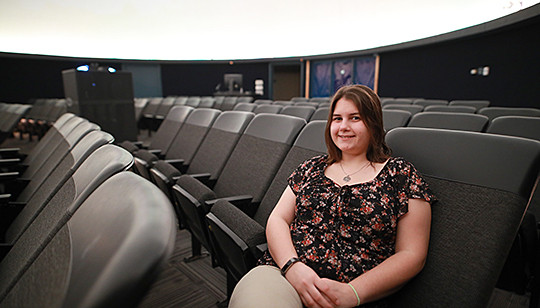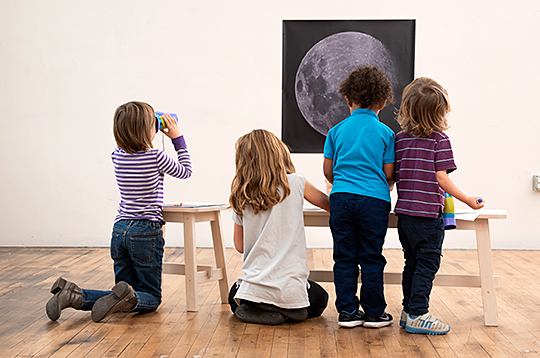A graduate student at The University of Toledo who aspires to someday teach at a planetarium went above and beyond to elevate an annual event aimed at inspiring and motivating children to engage with science.
From playing hide-and-seek moon using binoculars to creating a pocket solar system to scale to using a tub of water to explain rising sea levels and climate change, this year’s Earth and Space Exploration Day at Ritter Planetarium will feature a new set of hands-on activities in astronomy and earth science using interactive demonstrations in collaboration with NASA and the National Informational STEM Education (NISE) Network.

Heidi Kuchta received kits from NASA and the National Informational STEM Education Network that will be distributed during Earth and Space Exploration Day Saturday, May 18, at Ritter Planetarium.
“I love that families in our community will have something incredibly interesting to do and stuff to take home,” Kuchta said. “With the support of the NISE Network and NASA, we are able to add a wonderful spark to our annual Astronomy Day by expanding and escalating the overall fun, learning experience for children.”
Earth and Space Exploration Day will take place Saturday, May 18, from noon to 4 p.m. at Ritter Planetarium. The free, public event also will include planetarium shows running in full dome every hour starting at 12:30 p.m., as well as solar observing, weather permitting.
“From the beginning, Heidi has shown tremendous dedication to our outreach efforts,” Alex Mak, associate director of Ritter Planetarium, said. “This workshop is just one example of her ability to expand upon our traditional educational mission.”

Children use binoculars and play hide-and-seek moon with a kit from NASA and the National Informational STEM Education Network.
“A lot of planetariums are in schools, so I thought this innovative path would be a good way to combine education and what I love to do here,” Kuchta said. “At a planetarium, we only have students for a short period of time. They’ll learn here, but, more importantly, it will get them asking questions, expand their curiosity, and maybe nourish the dream of becoming the scientists who get people to Mars or become the first person to walk on Mars.”
Kuchta’s connection to the cosmos began as a baby, according to family legend.
“My mom took me to a planetarium at the Cleveland Museum of Natural History when I was a few months old because she was chaperoning a trip for one of my older siblings,” Kuchta said.
Ritter Planetarium proved to be the deciding factor in choosing a college.
“During a campus tour, I was hooked when we walked through the planetarium and checked out the telescope,” Kuchta said.
Kuchta helps put on planetarium shows that explain current celestial phenomena and leads tours from different groups of visitors ranging from residents of a senior center to a preschool class. She also helps create content.
“Heidi is creative, energetic, and always willing to find new ways to help people learn more about the universe,” Mak said. “She has a bright future.”